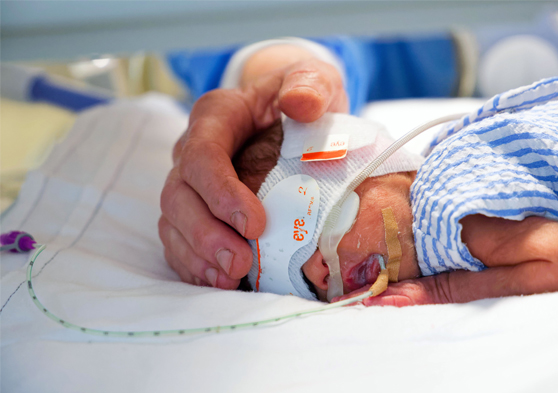Search

The CIRCA DIEM study aims to establish if cycling environmental light and noise levels for premature infants during their initial hospital stay leads to earlier development of circadian (daily) rhythms and better outcomes for the preterm babies, including improved brain development.
Research
Co-designing a trauma-informed program for parents whose infant has had a Neonatal Intensive Care Unit (NICU) admissionHaving a newborn child admitted into a NICU can be highly traumatic for parents. The compounding effects of the NICU clinical environment, having a seriously ill child, in addition to the inability to care or adequately bond with your child can be extremely distressing.
Research
COMBAT CF: A phase 3 multi-centre randomized placebo-controlled study of azithromycin in the primary prevention of radiologically-defined bronchiectasis in infants with cystic fibrosis.A phase 3 multi-centre randomized placebo-controlled study of azithromycin in the primary prevention of radiologically-defined bronchiectasis in infants with cystic fibrosis
Research
Communication, fetal alcohol spectrum disorder and youth justiceInvestigators: Natalie Kippin This research aims to examine the communication abilities of young people sentenced to detention in Western Australia,
Research
Community and Food Environments studyGina Nicole Trapp Hanna BHSc(Hons1A), RPHNutr, PhD BHlthSc (Hons) Honorary Research Associate Program Manager 08 6319 1033 Gina.Trapp@thekids.org.au
Research
Comodity forecastingProject description This project support the development of 10-year global forecasts of nets, insecticides, diagnostics, and treatments for malaria
Research
Comparing and combining the effects of low dose ultraviolet and physical activityShelley Prue Gorman Hart BSc (Hons) PhD BSc (Hons) MSc PhD Honorary Research Associate Honorary Research Fellow shelley.gorman@thekids.org.au
Research
Computational fluid-particle dynamic and pharmacokinetic assessment of electronic cigarette aerosols for improved understanding of their potential to impact healthThis project will use computational methods to assess the deposition of e-cigarette aerosols in the lungs, and the distribution of chemicals within e-cigarette aerosols throughout the body.
Research
CONNECT – Collaborative Network for Neuro-oncology Clinical TrialsRaelene Endersby BSc (Hons) PhD Brainchild Fellow; Co-Head, Brain Tumour Research raelene.endersby@thekids.org.au Co-Head, Brain Tumour Research
Research
Containing Coronavirus Disease 19 (ConCorD-19)Chile has been hard hit by COVID-19, at times reporting around 6500 new cases a day, with many of these located in the capital Santiago.
